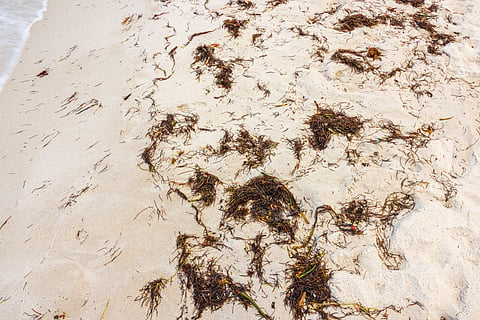

Dry seaweed scattered on bright sand along Atlantic Ocean shore in Miami Beach on summer afternoon.
Researchers at the University of Florida’s Institute of Food and Agricultural Sciences (UF/IFAS) and the Florida Sea Grant program are leading a project to explore whether seaweed could become the state's next major sustainable crop.
The project, which has already received a $250,000 grant from NOAA's National Sea Grant Aquaculture Program, brings together scientists, industry partners, and stakeholders to determine whether Florida can benefit from one of the fastest-growing commodity sectors in the world.
"Florida's vibrant shellfish aquaculture and commercial fishing industries provide an ideal opportunity to explore seaweed farming, since existing fisheries operations offer a skilled workforce and functional working waterfront infrastructure," said Angela Collins, Florida Sea Grant assistant Extension scientist specializing in marine fisheries and shellfish aquaculture at the UF/IFAS Tropical Aquaculture Lab.
Moreover, Ashley Smyth, associate professor of soil, water, and ecosystem sciences at the UF/IFAS Tropical Research and Education Center and lead investigator on the initiative, noted that seaweed could serve both as a product for growers and as a tool to improve water quality.
Currently, seaweed farming in Florida exists only on a small scale and in closed tank systems. For that reason, the team is also assessing the market potential.
Andrew Ropicki, marine resource economics specialist at Florida Sea Grant UF/IFAS, along with shellfish grower Aaron Welch of Two Docks Shellfish Co., has already conducted small-scale pilot trials along Florida’s Gulf Coast.
